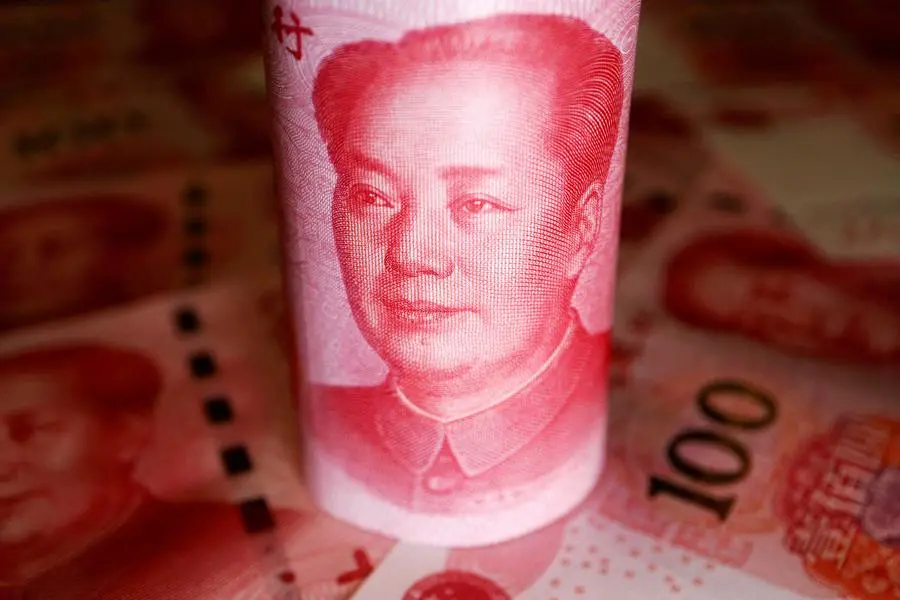PHOTO
SINGAPORE - Decades-long foreign bullishness on China's capital markets is breaking down, investment flows and interviews with fund managers suggest, with a new era of uncertainty fuelled by geopolitical risks and U.S. investors especially wary.
There have been ample excuses to buy China as the world's second biggest economy gathers steam.
Post-pandemic recoveries in exports, property and shopping have run harder than expected. Stock market returns are solid. Jack Ma's reappearance and plans to break up his Alibaba empire were also seen as ending a few years of regulatory crackdowns.
But big, long-term foreign investors, are missing. Their absence, and asset managers' reasons for it, reveal a wariness in the investment community over how to price new risks for capital as China becomes a great power and a great U.S. rival.
It is unlikely to be resolved quickly even if the markets keep rallying and China economy keeps global growth ticking.
"It's around capital preservation, not really the returns," said Hayden Briscoe, Asia-Pacific head of multi-asset portfolio management, at UBS Asset Management in Hong Kong.
"Foreign money at the moment, particularly from the U.S., is reluctant to invest," said Briscoe. He himself is positive on China, but said many managers are steering clear after seeing wartime sanctions erase the value of Russian investments.
"(They are) still looking at geopolitical risk and the Russia experience recently probably makes them more tentative than they normally are."
Data paints a murky picture, but supports brokers' analysis that the bid from long-only money managers is absent.
Flows figures show net foreign buying of about 188 billion yuan ($27 billion) this year. That is large, but most of that was crowded into January when "fast money" hedge funds were riding momentum as COVID rules relaxed and markets rallied.
Allocation analysis from data firm EPFR shows a broad downtrend, especially to U.S.-domiciled China funds. Allocation to those hit a record low last October and has been falling on an annual basis for four years, EPFR figures show.
HSBC research says global funds are underweight on China and Bank of America has noted the effect on market dynamics.
"Without the long term anchoring investors, the H-share market becomes more volatile, driven by the ins-and-outs of 'quick money'," said Bank of America's chief China equity analyst Winnie Wu after surveying some 30 Hong Kong funds.
GAME CHANGER
The investment mood reflects political discomfort in the West with China's rise. Competition with the U.S., in particular, has intensified from trade spats to strategic rivalry that has prompted export and investment bans on Chinese chipmaking and other sectors seen as militarily important.
Multi-national firms are also re-making their supply chains to avoid such heavy reliance on Chinese manufacturing, trends investors say change the risk-reward calculus on the country.
"Virtually from 2000 until pre-COVID, it was all a one-way bet for China," said Ashley Pittard, head of global equities at Pendal in Sydney.
"But the game has changed," he said. "They've been the manufacturing hub of the world...(but) the pendulum has shifted. It's not as clean as it used to be...it's not as easy as just throwing money at the big cap Chinese stocks."
To be sure, sentiment can shift quickly and plenty of investors remain willing to invest in China and are positive on the outlook - including, for example, sell-side analysts at Morgan Stanley and other major U.S. banks.
EPFR figures show allocation to China funds outside the U.S. has increased for two years and mainland markets' recent performance has also been encouraging.
Since late October, when rumblings of a shift in China's COVID policy began, the CSI 300 blue chip index and the Shanghai Composite are each up more than 13% against a 6% gain for the U.S. S&P 500 over the same period.
"We've come to this conclusion that the rally is maybe one half to one third of the way through. We still think there is opportunity for investors," said Robert St Clair, head of investment strategy at Fullerton Fund Management in Singapore.
"The key signpost that will keep the rally going, and that’s what we're watching, is when earnings expectations start to revise upwards."
Still, others' hesitancy can be self-fulfilling, if lacklustre flows hold back performance and fail to offer compelling reasons for foreigners to leave their home markets.
"We're positive on China over the short term but our long term outlook is neutral to negative," said John Pearce, chief investment officer at Australia's A$115 billion ($75 billion) UniSuper.
"As it's impossible to quantify geo-political risks we don't attempt to," he said. "Our reservations about China's long-term investment prospects are based on our outlook for returns to capital." ($1 = 6.9024 Chinese yuan renminbi or 1.4981 Australian dollars)
(Reporting by Tom Westbrook; Editing by Lincoln Feast)





















